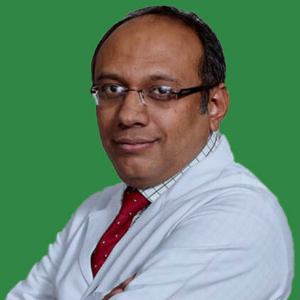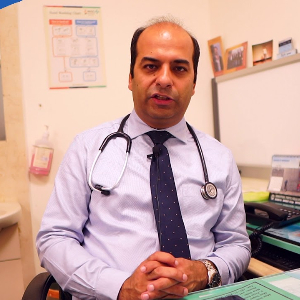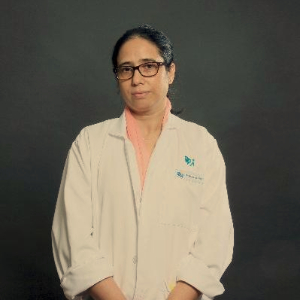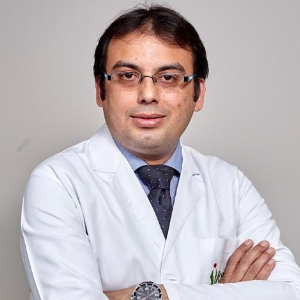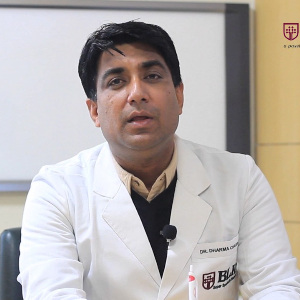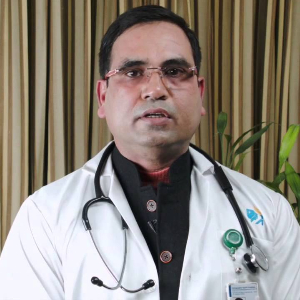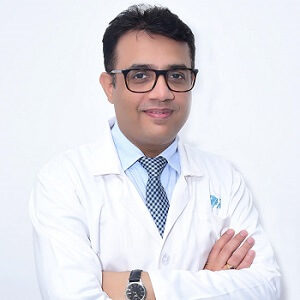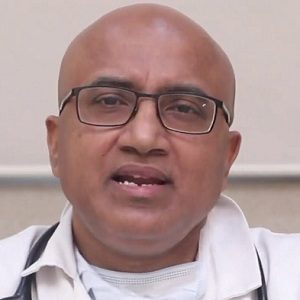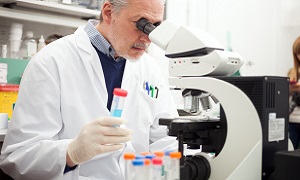Best Lymphoma Treatment Doctors in India
- Hematologist & BMT Specialist, Gurugram, India
- Over 20 years’ experience
Profile Highlights:
- Dr. Rahul Bhargava is a leading Hematologist and Bone Marrow Transplant specialist who specializes in Haploidentical and unrelated match transplants and has performed over 400 Bone Marrow Transplants.
- He became the first doctor in India to introduce Stem Cell Transplant for Multiple Sclerosis in 2016.
- With his team of oncology specialists, Dr. Rahul Bhargava performed the first Haploidentical Stem Cell transplant on a Fanconi Anemia patient in India.
- Medical Oncologist, Gurugram, India
- Over 16 years’ experience
Profile Highlights:
- Dr. Ankur Bahl is a reputed medical oncologist in India.
- With over 16 years of experience, Dr. Bahl is considered for his expertise in treating Multiple Myeloma, Lymphoma, Leukemia, Gastrointestinal tumors, Gynaecological Tumors, Head, Neck, and Brain Tumors.
- Surgical Oncologist, New Delhi, India
- Over 20 years’ experience
Profile Highlights:
- One of the finest oncologists in India, Dr. Ruqaya Ahmad Mir has been practicing surgical oncology for the past 20 years and is currently functioning as a Senior Consultant, Oncology at Indraprastha Apollo Hospital, New Delhi.
- Dr. Ruqaya Mir is known for her outstanding performance in some of the advanced surgical techniques which include Uterus and Ovary and Limb Conservation surgery and Cytoreductive surgery and Hyperthermic Intraperitoneal chemotherapy for advanced colorectal and recurrent ovarian malignancies.
- She is also a well trained Robotic Surgeon practicing implementation of minimal invasion in surgical oncology.
- Pediatric Hemato Oncologist & BMT Surgeon, Gurugram, India
- Over 20 years’ experience
Profile Highlights:
- Dr. Vikas Dua is one of the best Pediatric Hemato Oncologist and Bone Marrow Transplant surgeons in India with over 200 pediatric Bone Marrow Transplants to his credit.
- His specialty lies in Pediatric haploidentical transplants and also finds interest in Bone Marrow Transplants for Leukemia and Thalassemia in pediatric patients.
- Dr. Vikas Dua received his training in Pediatric BMT from St. Jude Children’s Research Hospital in Memphis and holds Fellowship in Pediatric BMT from the National University Hospital in Singapore.
- Hemato Oncologist & BMT Specialist, New Delhi, India
- Over 15 years’ experience
Profile Highlights:
- Dr. Dharma Choudhary is a renowned Hemato Oncologist who has more than a decade of experience in the field and is one of the best doctors in India for Hemato-Oncology.
- Dr. Choudhary is an expert in bone marrow transplantation for leukemia in adults, stem cell transplant for leukemia, and lymphoma (blood cancer) in adults and his expertise also lies in the treatment of solid tumors and various benign blood disorders.
- Dr. Choudhary holds the credit of performing some of the most complex bone marrow transplants in India and has had several successful results to his name.
- Medical Oncologist, New Delhi, India
- Over 20 years’ experience
Profile Highlights:
- Dr. P K Das is one of the best Oncologists in India with an extensive career as the Senior Consultant Medical Oncologist, the Hemato- Oncologist, and Academic Coordinator of Dept of medical oncology at the Apollo Cancer Institute in New Delhi.
- With many years of experience at the Apollo Hospital, Dr. P K Das has been diligently treating patients and proactively contributing to the medical sector by working alongside topmost doctors in medical oncology.
- Pediatric Hemato-oncologist, Hematologist, New Delhi, India
- Over 17 years’ experience
Profile Highlights:
- Dr. Gaurav Kharya is one of India’s top pediatric hematologists. He has over 17 years of expertise and is affiliated with Indraprastha Apollo Hospital.
- Dr. Kharya specializes in pediatric hemato-oncology, immunology, and bone marrow transplantation. He has extensive expertise in transplanting in children with benign or malignant blood abnormalities, immunological disorders, and other conditions both nationally and internationally.
- Dr. Kharya performed around 600 bone marrow transplants with his team. He undertook the first haploidentical bone marrow transplant for sickle cell disease in India. He also depleted TCR alpha beta CD 19 in invitro by haploidentical BMT in a 4-month-old baby with severe combined immunodeficiency.
- Paediatric Hematologist, Chennai, India
- Over 24 years’ experience
Profile Highlights:
- As a hematologist, Dr. Revathi Raj has been practicing successfully for over 24 years.
- She provides treatments for thalassemia, eosinophilia, male and female health screening, and biochemistry.
- Dr. Revathi is a member of the Indian Medical Association (IMA).
- Medical Oncologist, New Delhi, India
- Over 15 years experience
Profile Highlights:
- Dr. Dipanjan Panda is one of the well-known medical oncologists in India, having 15 years of expertise in treating bone and soft tissue cancers and gastrointestinal cancers.
- He is credited with starting the country’s first anticancer departments and PDCC program. Dr. Panda developed a medical oncology unit at Indraprastha Apollo Hospital in New Delhi, in association with the Institute of Liver and Biliary Sciences. He is currently working at Indraprastha Apollo Hospital in New Delhi as a Senior Consultant, Medical Oncology.
- Dr. Panda has written twenty peer-reviewed papers in national and international journals. He has presented numerous talks at global forums.
- Medical Oncologist, New Delhi, India
- Over 20 years’ experience
Profile Highlights:
- Dr. Amit Agarwal is a highly successful Medical Oncologist whose primary focus lies on pain management in cancer patients and provides treatment specifically for the management of early stages of Hodgkin’s disease and Non-Hodgkin Lymphoma, Non-Metastatic Ewing’s Sarcoma, Cardiopulmonary Resuscitation, and emergency medications for cancer patients.
- Dr. Agarwal has been part of other prestigious cancer hospitals where he has helped in the treatment of patients with various types and rare cases of cancer.
Best Lymphoma Treatment Hospitals in India
Indraprastha Apollo Hospital, New Delhi
- City: New Delhi, India
Hospital Highlights:
- Indraprastha Apollo Hospital is a 700-bedded multispecialty hospital in the heart of the capital of India. It is a part of Apollo Hospital group, one of India’s most reputed healthcare chains. Indraprastha Apollo Hospital has been accredited by Joint Commission International, making it the first internationally accredited hospital in the country in 2005.
- There are 52 specialties in the hospital with one of the best cardiology centers in the country. The hospital is also equipped with State of the art infrastructure facilities with the largest Sleep Lab in Asia and the largest number of ICU bed facilities in India.
- The hospital also has one of the largest dialysis units in India along with a dedicated Bone Marrow Transplant unit.
- The latest and highly advanced technologies that are installed in the hospital include Da Vinci Robotic Surgery System, PET-MR, PET-CT, Cobalt-based HDR Brachytherapy, Brain Lab Navigation System, Tilting MRI, Portable CT scanner, 3 Tesla MRI, 128 Slice CT scanner, DSA Lab, Endosonography, Hyperbaric Chamber and Fibro scan.
Fortis Memorial Research Institute, Gurugram
- City: Gurugram, India
Hospital Highlights:
- Fortis Memorial Research Institute is a multi-super-specialty, quaternary care hospital with 1000 beds. The hospital comprises reputed clinicians, and international faculty and is also equipped with cutting-edge technology. The hospital is a part of Fortis Healthcare Limited, a reputed chain of private hospitals in India.
- It is a NABH-accredited hospital that is spread across 11 acres of land and has a capacity of 1000 beds. The hospital has 55 specialties and is one of the premier health care centers in the Asia Pacific region popularly known as “the Mecca of Healthcare”.
- The hospital has 260 diagnostic centers and is also equipped with the latest and advanced techniques that include 3 Telsa which is the world’s first Digital MRI technology. The hospital also has world-class Radiation Therapy techniques which have been developed by leading technology experts from Elekta and Brain Lab.
Apollo Hospital, Chennai
- City: Chennai, India
Hospital Highlights:
- Apollo Hospitals, Chennai, is one of the best hospitals for heart care in India. Over the years, Apollo has expanded all over India, as a healthcare chain.
- India’s first ‘Only Pancreas’ transplant was performed in Apollo Hospital. The hospital is known for successfully performing Asia’s first en-bloc combined heart and liver transplant, and over the years, it has attained a remarkable achievement in the global healthcare space. Around 3-4 organ transplants are performed in the hospital per day.
- Equipped with over 500 beds, this hospital in Chennai was established in 1983 and since then has been among the most preferred hospital for patients from all over the world.
- The hospital holds accreditation of the NABH and JCI and is the first hospital in India to be ISO 9001 and ISO 14001 certified. It is also the first South Indian Hospital to receive subsequent reaccreditation from the JCI USA 4 times.
Medanta-The Medicity, Gurgaon
- City: Gurugram, India
Hospital Highlights:
- One of India’s best and largest multi-specialty hospitals, Medanta was built with the aim to bring India to the highest standards of medical care. The hospital has been providing the best medical services to its patients, since its inception, with care, commitment, and compassion.
- Equipped with 1250 beds, the hospital was founded by Dr. Naresh Trehan in the year 2009 with an aim to provide the best medical care at affordable costs. The hospital is spread across 43 acres and includes 45 operation theatres and 350 beds dedicated solely to ICU. The hospital includes over 800 doctors, and more than 22 specialty departments and has a dedicated floor for individual specialty in order to offer the best services under one roof.
- The hospital is considered one of the premier institutes in India for Cardiac Care and includes staffs and members of high caliber. The hospital has 6 distinct centers of excellence.
Max Super Specialty Hospital, New Delhi
- City: New Delhi, India
Hospital Highlights:
- One of the well-regarded providers in India committed to the highest standards of clinical excellence and patient care, Max Super Specialty Hospital is a part of Max Healthcare, which is the second-largest healthcare chain in India. Regarded as one of the most well-regarded healthcare providers in the country, Max Super Specialty Hospital is committed to the highest standards of clinical excellence as well as patient care. The hospital is also equipped with the latest technology as well as cutting-edge research. The hospital is known to deliver and ensure the highest level of patient care.
- The hospital has more than 500 beds and offers treatment for over 35 specialties. The hospital also holds the credit of having installed the first Brain Suite in Asia. This is a highly advanced Neurosurgical machine that allows MRI to be taken while surgery is ongoing.
- Other advanced and latest technologies are also installed in the hospital such as the 1.5 Tesla MRI machine, 64 Slice CT Angiography, 4D ECHO, LINAC, and 3.5T MRI machine.
Artemis Hospital, Gurugram
- City: Gurugram, India
Hospital Highlights:
- One of the most well-known hospitals in the Delhi NCR, Artemis Hospital is the first hospital in Gurugram to get accredited by the Joint Commission International.
- With more than 40 specialties, the hospital has been designed to be one of the most technically advanced hospitals in the country, with the best medical and surgical health care. The hospital has eleven special and dedicated centers, for Heart, Cancer, Neurosciences, etc.
- The latest technologies in the hospital include Endovascular Hybrid Operating Suite and Flat panel Cath Labs for the cardiovascular department, 3 Tesla MRI, 16 slice PET CT, 64 Slice Cardiac CT Scan, HDR Brachytherapy, and highly advanced Image Guided Radiation Therapy techniques (LINAC) are installed in the hospital.
- The hospital has won several awards as well, since its inception.
BLK Max Super Specialty Hospital, New Delhi
- City: New Delhi, India
Hospital Highlights:
- Equipped with 650 beds, BLK Superspecialty Hospital is the largest stand-alone private sector hospital in Delhi.
- With over 1500 healthcare providers and 150 globally renowned super specialists, the hospital is one of Asia’s largest Bone Marrow Transplant Centres. The hospital is known for having some of the best cancer doctors in the country.
- The hospital is NABH and NABL accredited and was inaugurated by the first Prime Minister of India. Pt. Jawahar Lal Nehru.
Gleneagles Global Hospitals, Chennai
- City: Chennai, India
Hospital Highlights:
- Established in 1999, Gleneagles Global Hospital, Chennai, is one of the top healthcare facilities in Southern India. It is part of the Gleneagles Hospital Chain, which is the fourth largest healthcare chain in the country. The hospital specializes in multi-organ transplants of kidneys, liver, lungs, heart, etc.
- The hospital has an excellent infrastructure and state-of-the-art lab and equipment set-up. The hospital boasts cutting-edge technologies, a highly skilled team of doctors and surgeons, and trained support staff. Located in Perumbakam, Chennai, it is one of India’s premier health care destinations. The hospital has performed some of the most complex surgical and clinical procedures in India including multi-organ transplantations.
- The hospital’s lung transplantation program is one of the best in the country. The hospital is known for having performed India’s first single lung transplant and first minimal invasive lung transplant. It is also the only Indian hospital to be associated with King’s College Hospital, London, United Kingdom for liver transplantations.
Fortis Hospital, Mulund, Mumbai
- City: Mumbai, India
Hospital Highlights:
- Fortis Hospital in Mulund is a 315-bed multi-speciality tertiary care hospital with five JCI accreditations that offers a wide variety of diagnostic and therapeutic services. The Fortis Hospital in Mulund delivers patient-centred treatment with cutting-edge technology, highly skilled and experienced surgeons, and paramedical staff.
- This institution houses Maharashtra’s largest multi-organ transplant centre. It is also the first heart transplant centre in western India to conduct 100 or more consecutive heart transplants in under four years. It is the only hospital in the city to have multi-organ transplants and has handled the youngest patient for angioplasty. Fortis Hospital Mulund now boasts the first advanced surgical robot in central Mumbai.
- Cardiology and heart surgery, urology, nephrology, neurosciences, orthopaedics, digestive care, emergency and critical care, and maternity care are among the services provided by the hospital.
Kokilaben Dhirubhai Ambani Hospital, Mumbai
- City: Mumbai, India
Hospital Highlights:
- Kokilaben Dhirubhai Ambani Hospital, Named after the wife of Indian industrialist Dhirubhai Ambani, the founder of Reliance Industries, this is one of the top hospitals in Mumbai. This 750-bed multi-specialty hospital became operational in 2009. Known as one of India’s most advanced tertiary care facilities, the hospital is designed to raise India’s global standing as a healthcare hub, with an emphasis on excellence in clinical services.
- Kokilaben Dhirubhai Ambani Hospital uses Protocol and Care Pathway based treatment models to ensure the best outcomes for patients.
- The hospital represents a confluence of top-notch talent, cutting-edge technology, state-of-the-art infrastructure, and, most importantly commitment.
- The hospital also holds the accreditation of the NABH, NABL, CAP, and JCI.
- The hospital has been recognized as the No. 1 Multispecialty Hospital in Mumbai and the West Zone for the fifth year in a row in 2020 by The Week.
Lymphoma
The cancer of the lymphatic system is called lymphoma. The lymphatic system comprises lymph nodes and vessels that are responsible for the movement of the lymphatic fluid throughout the body. White blood cells that fight the infections are present in the lymph fluid. The lymph nodes prevent the spread of infection. Lymphoma affects various parts of the body like bone marrow, lymph nodes, thymus gland, tonsils and spleen. Depending upon the type of lymphoma and the stage, the treatment for lymphoma varies. The cells of the lymphatic system are lymphocytes from where the lymphoma starts.
Types of Lymphoma
There are two main types of lymphoma. They are Hodgkin’s lymphoma and Non-Hodgkin’s lymphoma. Formerly, Hodgkin’s disease was the name used for Hodgkin’s lymphoma. The other types of lymphoma are:
- Chronic lymphocytic leukemia – It is a type of cancer that occurs in the bone marrow (the spongy tissue filling the inside of the bones) and blood.
- Cutaneous B-cell lymphoma – It is rare cancer that affects the skin. It begins in the B-cells, a type of white blood cells.
- Cutaneous T-cell lymphoma – This is rare cancer affecting the T-cells, a type of white blood cells. The T-cells are responsible for the germ-fighting mechanism of the immune system.
- Waldenstrom macroglobulinemia – The bone marrow produces abnormal white blood cells in large numbers in this rare cancer. The abnormal white blood cells impair the circulation that results in complications.
Causes of Lymphoma
When the lymphocytes (white blood cells) that fight diseases develop genetic mutation, the condition causes lymphoma. The cells multiply instantly due to the mutation that causes multiplying diseased lymphocytes. While the normal cells die, the diseased lymphocytes continue to live due to this genetic mutation. As a result, there are numerous diseased lymphocytes in the lymph nodes that cause swelling of the lymph nodes, spleen and liver.
This uncontrolled cell growth is largely responsible for causing lymphoma. People suffering from lymphoma have these diseased cells that continue to live and not die. However, it’s still unclear what actually causes lymphoma.
Symptoms of Lymphoma
In the early stage of this cancer, there are no symptoms. On physical examination by a doctor, you might come to know about the swelling in the lymph nodes. When there are small, soft nodules felt under the skin, it reveals that there is a swelling in the lymph nodes. One may feel the lymph nodes in the neck, armpit, upper chest, groin and stomach region.
There are various symptoms associated with lymphoma. The symptoms of lymphoma are not easy to detect and hence, the patient often learns about cancer in a later stage. These symptoms are:
- Unexplained weight loss
- Pain in the bones
- Painless swelling of the lymph nodes in various parts of the body
- Fever
- Cough
- Shortness of breath
- Itchy skin and rashes in the skin folds
- Stomach pain
- Pain during alcohol consumption
- Fatigue
- Night sweats
- Enlarged spleen
Diagnosis of Lymphoma
If the physical examination reveals symptoms of lymphoma, the doctor takes a biopsy for the diagnosis of cancer. For a biopsy, there is the removal of cells from the enlarged lymph nodes. A hematopathologist examines the cells to check for the lymphoma cells. If the lymphoma cells are present, the doctor also tells the type of cells. Upon finding the presence of lymphoma cells, the patient must undergo further testing to know the extent of the spread of these cells.
The various tests for lymphoma are blood testing, chest x-ray, testing of the lymph nodes and imaging scans like magnetic resonance imaging (MRI) or computed tomography (CT) that identify enlarged lymph nodes and additional tumors.
Physical Examination
Lymph node removal
Blood testing
Bone marrow sample for testing
Imaging scans
Treatment Options for Lymphoma
Regular monitoring

Radiation therapy
Chemotherapy

Bone marrow transplant
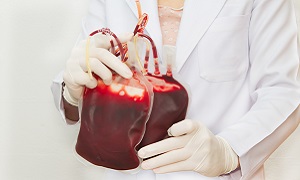
Other treatment
Immunotherapy drugs kill the cancer cells while chimeric antigen receptor (CAR)-T cell therapy takes healthy T cells from your body and fights the cancer cells.

